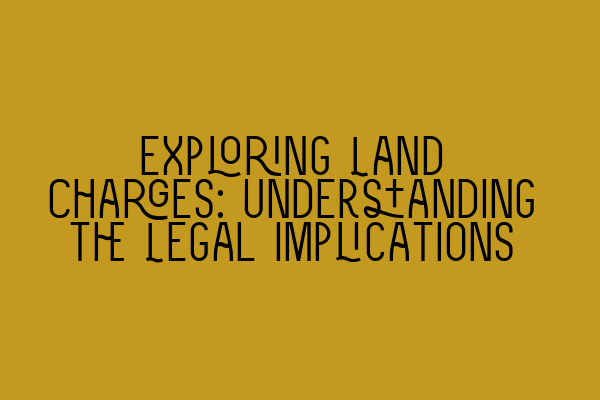Exploring Land Charges: Understanding the Legal Implications
When it comes to property transactions, understanding the concept of land charges is essential. Land charges are legal obligations or restrictions that are registered against a property. These charges can have significant implications for both buyers and sellers, making it crucial to have a comprehensive understanding of their nature and how they can impact a transaction.
In this article, we will explore land charges in detail, including the types of land charges, their significance, and how they can be dealt with during the conveyancing process.
Types of Land Charges
There are various types of land charges that can affect a property. These include:
- Registered Charges: These are charges that are registered with the Land Registry. Examples include mortgages, charges for securing loans, and rights of way.
- Unregistered Charges: These are charges that are not registered with the Land Registry. They are usually older charges that have not been updated or newer charges that do not require registration, such as certain types of leases.
- Financial Charges: These are charges that are related to financial obligations, such as mortgages, loans, or debts on the property.
- Non-Financial Charges: These are charges that are not related to financial obligations but can still affect the property, such as rights of way, restrictive covenants, or easements.
Significance of Land Charges
Land charges carry significant legal implications for property transactions. They can affect the rights and obligations of both buyers and sellers, and failing to consider these charges can lead to complications and disputes down the line.
For buyers, land charges can limit the use and enjoyment of the property. For example, a restrictive covenant may prevent the buyer from making certain modifications or alterations to the property. Similarly, an easement may give someone else the right to access the property, which can impact privacy and exclusivity.
For sellers, land charges can affect the marketability and value of the property. Buyers may be hesitant to proceed with a purchase if there are significant land charges that could restrict their use of the property or lead to potential legal disputes in the future. Therefore, sellers must ensure that any existing land charges are adequately disclosed to potential buyers.
Dealing with Land Charges in Conveyancing
Conveyancing is the legal process of transferring property ownership from a seller to a buyer. During the conveyancing process, it is crucial to identify and address any land charges that may affect the property.
Buyers should conduct thorough searches to identify any registered or unregistered charges that may be associated with the property. This includes obtaining Official Copies of the Register and conducting local searches to uncover any undisclosed charges or restrictions.
Once the land charges have been identified, buyers and sellers can negotiate their impact on the transaction. This may involve seeking legal advice to understand the implications of the charges and determining whether any modifications or special provisions need to be included in the contract.
It is worth noting that while certain land charges can be removed or discharged, others may be permanent and continue to affect the property even after a change in ownership. Therefore, it is crucial to engage an experienced solicitor who can guide you through the process and ensure that all necessary steps are taken to address the land charges appropriately.
Conclusion
Land charges are an important consideration in property transactions, as they can have significant legal implications for both buyers and sellers. Understanding the different types of land charges and their significance is crucial for ensuring a smooth and successful transaction.
If you are preparing for the SQE exams or need help with property law and land law-related topics, consider checking out our related articles:
- SQE 1 Practice Exam Questions
- SQE 1 Practice Mocks FLK1 FLK2
- SQE 2 Preparation Courses
- SQE 1 Preparation Courses
- SRA SQE Exam Dates
At SQE Property Law & Land Law, we offer comprehensive preparation courses and resources that can help you ace your exams and gain a deeper understanding of property law concepts. Contact us today to learn more!
